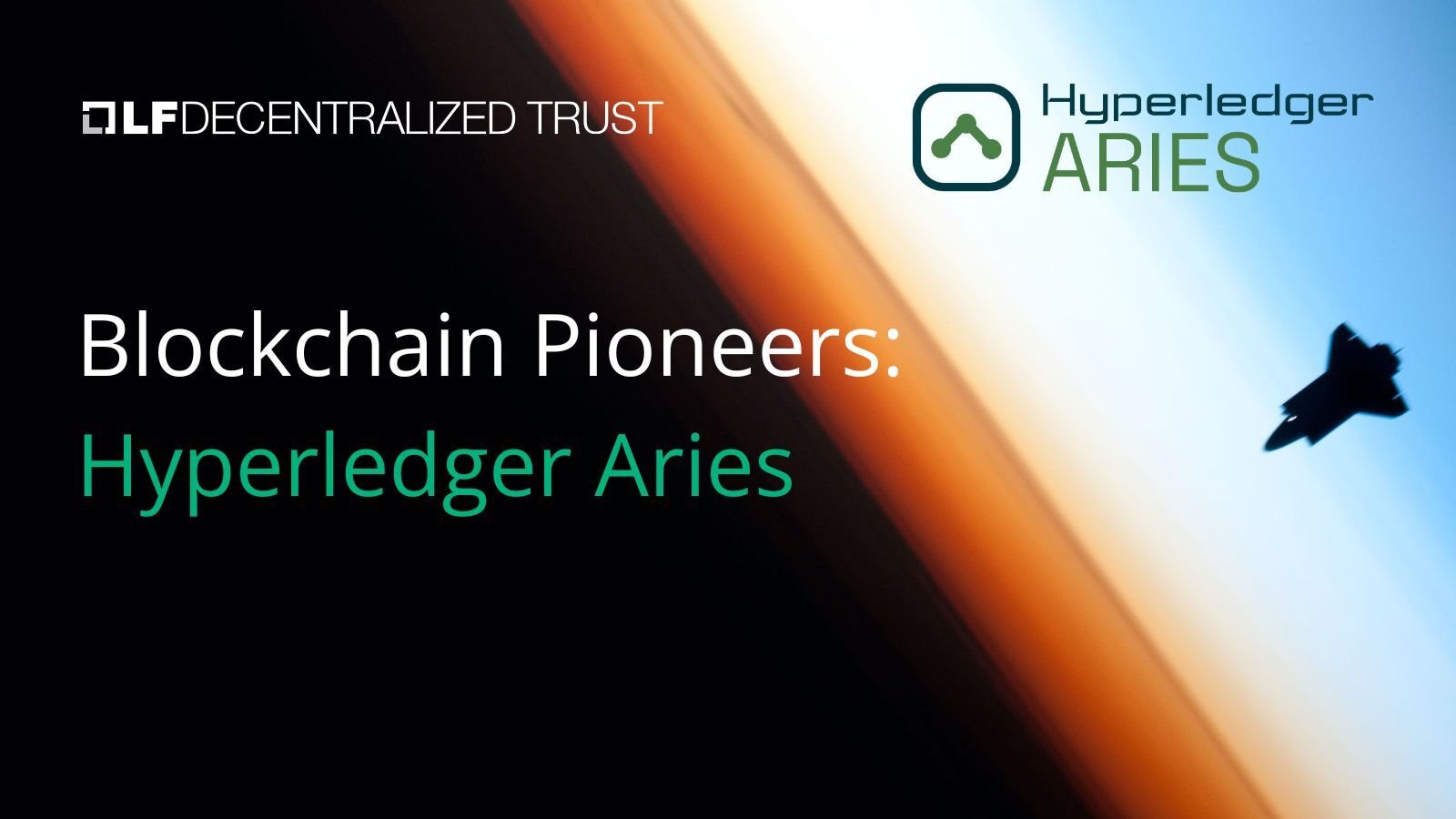Blockchain Pioneers: Hyperledger Aries

As Hyperledger Foundation laid out in the Helping a Community Grow by Pruning Inactive Projects post, there is an important life cycle to well governed open source projects. Through the evolution of the market, Hyperledger Foundation and, now, LF Decentralized Trust has been the home to a growing ecosystem of blockchain, identity, and related projects.
A number of projects that helped drive innovation and advanced the development of enterprise-grade decentralized technologies have cycled through the life cycle to the archived stage. This series looks back at the impact of these pioneering projects.
Hyperledger Aries, a project focused on building a shared, reusable, interoperable toolkit for developing critical digital credential solutions, evolved into an ecosystem of credentialing technologies that now extend well beyond its original home in LF Decentralized Trust. While the project known as Hyperledger Aries is now being archived, its core components live on—actively maintained and evolving in the OpenWallet Foundation (OWF). The Aries RFCs, the protocol specifications that enable interoperability across implementations, have found a new home in the Decentralized Identity Foundation (DIF), where they continue to guide cross-project collaboration.
The magic of Aries was the evolution from a single codebase into a collaboration on a set of protocols and then to an ecosystem of diverse implementations, and, ultimately, into a cornerstone of OWF, a foundation focused specifically on wallet technology. Its journey from single project to foundational industry framework is next up in this series.
History
Hyperledger Aries was approved as a new project in April 2019 with sponsors from Sovrin Foundation, Evernym, SecureKey, BC Gov and more organizations.
The project’s goal was to develop an interoperable, decentralized identity (DID) infrastructure. It focused on building protocols and agent frameworks to enable secure, peer-to-peer messaging using DIDs and verifiable credentials. Aries emerged from the Hyperledger Indy project, taking the “agent” part of that project into the wild. The focus on well-specificed protocols for messaging and credential exchange led to an implementation boom, with at least 7 different groups building interoperable codebases. In a wave of innovation around self-sovereign identity (SSI) and Aries (along with AnonCreds) stood out for its practical, modular, and yet easily interoperable approach.
Innovations in Hyperledger Aries
The key innovation of Hyperledger Aries was its community-driven focus on defining interoperable protocols for digital trust. Rather than delivering a monolithic software stack, Aries established a modular, protocol-first architecture centered around defining DIDComm, a secure messaging framework for peer-to-peer communication. On top of DIDComm, the community collaboratively developed protocols for core trust activities—connecting, issuing, presenting, messaging, and revoking.
Teams across the ecosystem built diverse Aries frameworks, and many, many more teams deploy solutions using those frameworks—embedded in mobile apps, cloud services, and edge devices—all implementing the same protocols and achieving interoperability by design. To guide implementation and align expectations, the community introduced the Aries Interop Profiles (AIP 1.0 and 2.0) and built the Aries Agent Test Harness, a tool for verifying protocol compliance and enabling consistent interop testing across agents.
One of Aries’ most impactful early contributions was its support for Hyperledger AnonCreds—a privacy-preserving credential format with advanced features like unlinkability, selective disclosure and zero-knowledge proofs. These capabilities made AnonCreds especially well-suited for high-trust, privacy-sensitive applications, and it became foundational to many Aries-based deployments, including government-issued IDs, financial services onboarding, academic credentials, and pandemic-related credentialing.
Importantly, Aries was never limited to AnonCreds—or even to DIDComm. The frameworks have evolved to support the W3C VCDM, SD-JWTs, mobile driver's licenses (mDL), and OpenID4VC protocols, ensuring continued relevance in a rapidly evolving digital credential landscape.
This protocol-first approach, backed by open governance and shared tooling, helped Aries become a foundational layer in the evolution of decentralized digital trust infrastructure.
Location of Current Activities
In April 2025, the maintainers of Hyperledger Aries requested that the project as it stood be archived since the different maintainer groups have moved their open source development efforts to individual projects in the OpenWallet Foundation and other homes under the Linux Foundation umbrella. Far from signaling an end, this request to archive the Hyperledger Aries name was a mark of success. Many of the frameworks that made up Aries had matured, and the communities and codebases around them had evolved into independent, focused projects.
The larger frameworks of Hyperledger Aries (notably ACA-Py, Credo-TS, VCX, and the Bifold Wallet) transitioned to the OpenWallet Foundation (OWF) where they are deployed in digital trust ecosystems around the world. The DIDComm RFC specifications moved to the Decentralized Identity Foundation (DIF) while some Aries related efforts moved to LF Decentralized Trust Labs to incubate and experiment without the formal constraints of top-level project status.
To help you find where different modules have moved to, here is a list of where different components can currently be found:
- ACA-Py: https://aca-py.org
- Bifold Wallet: https://github.com/openwallet-foundation/bifold-wallet
- Credo-TS: https://github.com/openwallet-foundation/credo-ts
- VCX: https://github.com/openwallet-foundation/vcx
- Aries RFCs: https://identity.foundation/aries-rfcs
- Aries Agent Test Harness: https://aries-interop.info
- Aries-bbssignatures-rs: https://github.com/LF-Decentralized-Trust-labs/aries-bbssignatures-rs
- Aries-framework-kotlin: https://github.com/LF-Decentralized-Trust-labs/aries-framework-kotlin
- Aries-framework-swift: https://github.com/LF-Decentralized-Trust-labs/aries-framework-swift
- Aries-uniffi-wrappers: https://github.com/LF-Decentralized-Trust-labs/aries-uniffi-wrappers
Legacy
The transition of Aries components to the new locations reflects the modular strength and strategic maturity of the Aries community. By spinning off dedicated communities and code to support expanding development, governance, and market needs, Aries has evolved to match the trajectories of its most critical innovations.
The Aries legacy continues to shape the decentralized identity space—now more widely distributed and mission-aligned than ever. Its protocols and frameworks live on in active development communities across open foundations, national identity programs, and commercial wallets.
The work of Hyperledger Aries is not over; it has simply evolved to meet the moment.
